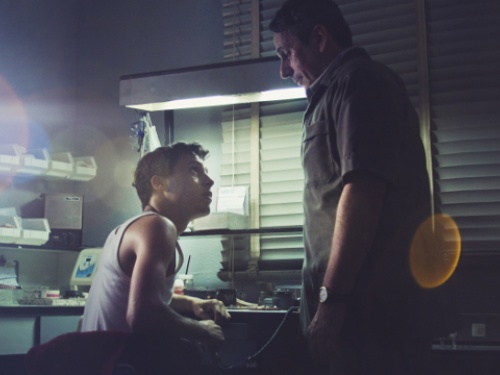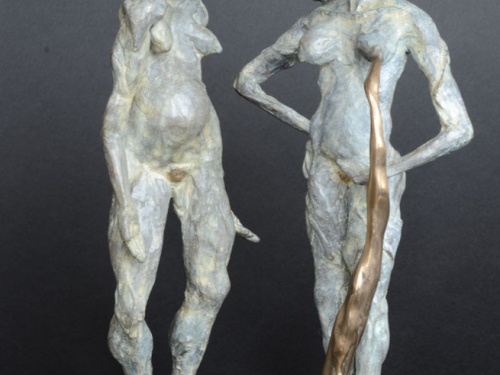A Losing Game: Chevalier and the Performance of Masculinity
To coincide with the ICA's run of Chevalier, Donna Peberdy explores rivalry, comedy and the deconstruction of conventional masculinity in Athina Rachel Tsangari's film.
Six male acquaintances sit around a dinner table aboard a luxury yacht in the Aegean Sea and make up a game to pass the time as they journey back to Athens. Each man is tasked with devising a challenge—“A physical test or a mental challenge”—in which they will all compete and then score each other based on their performance, recording their observations in small notebooks. “I propose… we don’t judge each other only on the chosen contests”, one says, “but on everything. Everything we do”. The prize for the eventual winner will be a signet ring, the titular “chevalier”, but is this really the point? That same evening, five of the men tiptoe into the sixth’s cabin to observe him while he sleeps. “Nice underwear”, one whispers. “Striped”. “His posture is excellent”, declares another. “His posture is too perfect”, a third comments, “still, his underwear is nice”. Thus starts the “Best in General” contest.
"'Your syntax is shit and your dick is very small' is the ultimate defamation."
Ordinarily mundane tasks and activities are raised as absurd challenges—from competitive window cleaning and silverware polishing, to stone-skimming and flat-pack furniture assembly—while the men subject each other to passive-aggressive questioning about raw fish consumption, teeth-brushing frequency and mobile phone ringtone choices. Nothing is beyond the scope of the contest; the men even compete over cholesterol and triglyceride counts. Narcissistic declarations and sideways glances punctuate every exchange and the most biting insults are delivered in the same matter-of-fact register as their most sincere compliments: “Your syntax is shit and your dick is very small” is the ultimate defamation. In its exploration of power and control, Chevalier follows on from director Athina Rachel Tsangari’s female-centred Attenberg (2010) and The Capsule (2012), which examine character relationships in challenging situations. Yet the games and the rivalry that ensues in this wonderfully droll comedy reveal more about the men’s insecurities and inadequacies than their skill.
The performative nature of masculinity is evident in the contrast between public displays of brutal honesty and the behaviour of the men in private. A distinguished and silver-haired sixty-something referred to only as “The Doctor” (classical theatre actor Yiorgos Kendros), professes to be a figure of health since giving up smoking but continues to smoke in secret. Yannis (Yorgos Pyrpassopoulos)—owner of aforementioned nice underwear—flaunts both his body and marriage to the Doctor’s daughter, but it is a front to hide feelings of inadequacy fuelled by his wife’s exceedingly handsome former lover, Christos (Sakis Rouvas).
"The games are approached as an affirmation of their prowess but instead the contest repeatedly undermines it."
Christos and the hirsute Yorgos (Panos Koronis) are the closest to conventional masculinity but it is not long before even their self-assured exteriors are undermined. “Do you think my thighs are fat?” Christos asks his wife on a video call after finding out that he has the worst cholesterol count. The games are approached as an affirmation of their prowess but instead the contest repeatedly undermines it. Josef (Vangelis Mourikis) drives himself to momentary madness in the pursuit of a “beautiful erection” following one contest. When his manhood finally responds to his desperate coaxing, there is no one there to see it; everyone is asleep. These private moments, away from the group dynamic, offer a refreshing departure from the standard script of masculinity we are so often presented with, demonstrating that men experience the same doubts, anxieties and uncertainties as women.
The men fuel and feed off these insecurities, unpicking each other’s self-esteem at the same time as they crave and invite reassurance. We are left with the impression that none of the men are really what they claim to be, except perhaps Yannis’s brother, the aspergic, childlike Dimitris (Makis Papadimitriou).
"A refreshing departure from the standard script of masculinity we are so often presented with."
Overweight, still living with his mother and with a pebble collection that would be the envy of In the Night Garden’s Makka Pakka, Dimitris is the furthest away from conventional masculinity but he is also the most likeable and genuine of the characters. Although he desires to be “Best in General” as much as any of them, he is not afraid to admit his inability to achieve what the other men strive to have validated and upholds his loyalty to the men even as they reveal their own hypocrisies.
Tsangari’s work has drawn comparison with the Greek New Wave, or “weird wave” to give it its more uncomplimentary label, in particular the films of Yorgos Lanthimos, director of Kinetta (2005), Dogtooth (2009) and Alps (2011), which Tsangari also produced. Indeed, Tsangari’s co-writer on Chevalier, Efthymis Filippou, also wrote Dogtooth, Alps and Lanthimos’s first English-language film The Lobster (2015). Chevalier has a different kind of humour, however, and none of Lanthimos’s sense of dread and foreboding. It has more in common with Reservoir Dogs (1992) or Glengarry Glen Ross (1992), where verbal sparring reveals more about male angst than power and control.
"Tsangari opts for playfulness over hostility. The bloodiest scene is also one of the most comical."
Tsangari opts for playfulness over hostility. The bloodiest scene is also one of the most comical as one character’s rebuffed attempt to become blood brothers with his travel companions does not result in the confirmation of camaraderie he was hoping for. Tsangari’s playfulness is particularly telling in her casting of Sakis Rouvas as Christos. If there was a “Best in General” contest in Greece, Rouvas the actor, model, pop star (the artist behind Greece’s biggest pop single), X-Factor host, one-time presenter and two-time entrant for the Eurovision Song Contest and former pole-vaulter, would undoubtedly be a strong contender.
Chevalier ultimately points to the futility of the men’s actions. With the entire game built on subjective opinion and the rules spuriously applied, the men are not even sure what the parameters are that they have set for themselves. It is no surprise, then, that when the Best in General is finally decided, who has won no longer seems that important. But we do get the sense Tsangari has enjoyed pulling the strings. ■
Chevalier is at the ICA from 22 July.
Dr Donna Peberdy is Senior Lecturer in the School of Media Arts and Technology at Southampton Solent University where she leads the Film and Television undergraduate degree. She is the author of Masculinity and Film Performance: Male Angst in Contemporary American Cinema (Palgrave Macmillan 2011) and co-editor of Tainted Love: Screening Sexual Perversion (I. B. Tauris 2016 forthcoming). Donna has published numerous articles on acting, performance, stardom, masculinity and sexuality and blogs from time to time at Improv: Reflections on Screen Acting and Performance.
This article is posted in: Articles, Blog, Film
Tagged with: Chevalier, Masculinity, Feminism, Film, Donna Peberdy, Masculinity in Film, Greek Film, Greek New Wave, Sakis Rouvas, Athina Rachel Tsangari, Weird Wave, The Lobster, Athina








